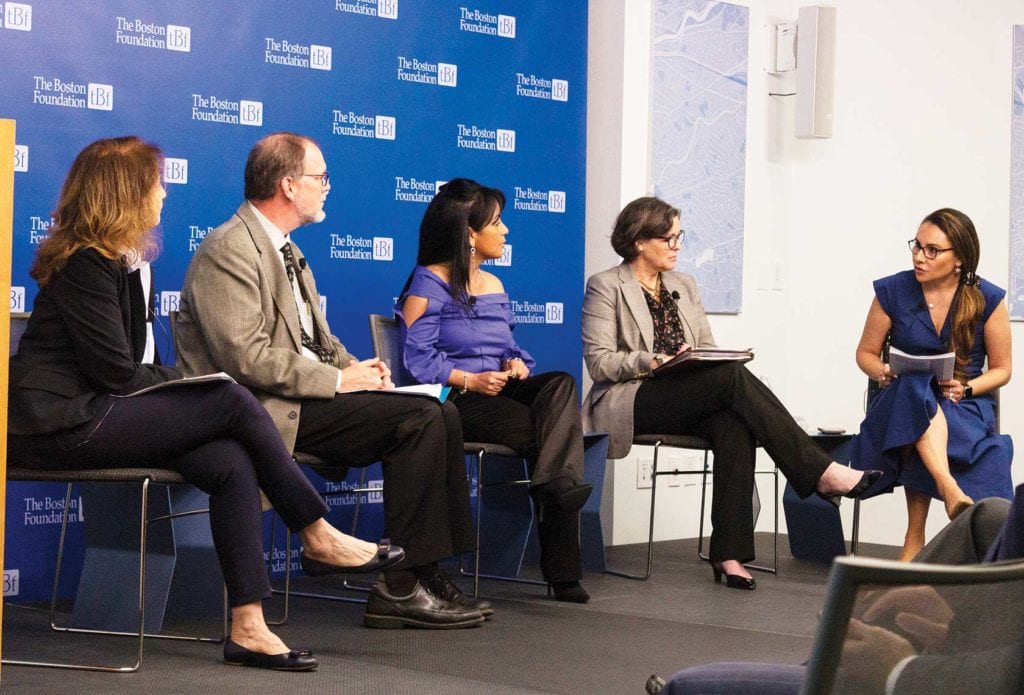DACA changes hit local residents hard
Report details effects of Trump admin. changes on 29k immigrants in Mass.

Strict immigration restrictions put in place by the U.S. federal government have had negative effects on immigrant communities throughout the country, and those in Massachusetts are no exception, according to a report released last week.
The report, published by the Boston Foundation’s Boston Indicators project, reveals that 17,000 people receiving or eligible for Deferred Action for Childhood Arrivals status and 12,000 Temporary Protected Status recipients live within the state, and all of them are in danger of losing their protections next year under changes made by President Donald Trump’s administration.
“[Their] lives are just hanging in the balance,” said Trevor Mattos, research manager at Boston Indicators. Speaking at a forum held by the Boston Foundation, Boston Indicators, the City of Boston and the Greater Boston Immigrant Defense Fund last week, he said, “[They are] people who have often lived most of their lives in Massachusetts or in the U.S. They’ve grown up here, and this is really their home. They have families and jobs and homes, and these are the people that the Trump Administration has chosen to target.”
Widespread changes
The report also showed that beyond holders of DACA, which protects immigrants who arrived in the U.S. as minors, and TPS, which applies to immigrants from certain countries with dangerous political or environmental situations, the Trump administration’s policies will affect thousands more immigrants in the state through proposed changes to other programs.
The administration has attempted to make victims of domestic and gang violence, and people who cross the border illegally, ineligible for asylum, which protects immigrants fleeing persecution or violence, and to drastically cut the number of refugees accepted into the U.S. each year. In addition, the administration has proposed denying green cards to immigrants who have used food stamps, public health insurance or other government benefit programs.
André Lima, policy and research director at the city’s Office of Health and Human Services, expressed concern about immigrants fearing to use health and social programs.
“About half a million in Massachusetts, many of them U.S. citizen children of immigrants, might be negatively impacted as families choose to disenroll themselves in critical programs for fear that they might put themselves at risk by continuing to use them,” he said. “When people discontinue treatment for chronic diseases, the health of whole communities can be in danger.”
Boston Mayor Martin Walsh, who spoke at the forum, underscored the importance of the Immigrant Defense Fund, which is a public-private partnership that provides legal representation for immigrants as well as community education and preparedness programs, such as “Know Your Rights” workshops.
“The Defense Fund has allowed us to protect and defend the immigrants in our community,” Walsh said. “When immigrants have representation, they win 62 percent of their cases. When they don’t have representation, they win 10 percent of the time.”
In a panel discussion at the forum, immigration attorneys and advocates related stories of people in and around Boston who have faced hardship through the enforcement of these policies, which often make the immigration system near-impossible to navigate.
Meg Moran, staff attorney with Greater Boston Legal Services, spoke of clients who were detained by Immigration and Customs Enforcement to the point where they endured psychological trauma just for fleeing persecution in their home countries.
“This administration is prioritizing all cases of people in detention,” Moran said. “They’re often saying the reason they’re doing that is it’s people who have committed crimes, but what we’re seeing is it’s really just a more expeditious way of deporting people.”
Taking responsibility locally
Gladys Vega, executive director of the Chelsea Collaborative, said that despite the state of Massachusetts’ good track record in comparison with more conservative states, it is still home to much of this kind of treatment, both in legal proceedings and everyday life.
“We cannot always blame the horrible administration that is in the White House. We also have to take responsibility for what we have not done in Massachusetts,” Vega said, specifically noting that undocumented immigrants cannot currently hold a driver’s license in the state. “We do not have an immigration policy yet that reflects the needs of the community. I think we cannot ignore the fact that we have to do our own stuff in our own state.”
In addition, the panelists, who also included Iris Gomez, a senior staff attorney with the Massachusetts Law Reform Institute, and Michael Raabe, director of data and policy analysis at Massachusetts Legal Assistance Corporation, all agreed that any sort of legal proceedings in immigration court affect not just the immigrant at risk of deportation, but his or her entire family.
“Although we’re talking here about immigration, when we deport that breadwinner, we’re left behind with a huge amount of problems that we need to address,” said Vega. “We have to figure out how this family is going to pay for their high cost of rent, how they’re going to afford food, we have to figure out how their kids are going to make it back to school, how is their family going to function. It’s horrible in terms of family composition.”






